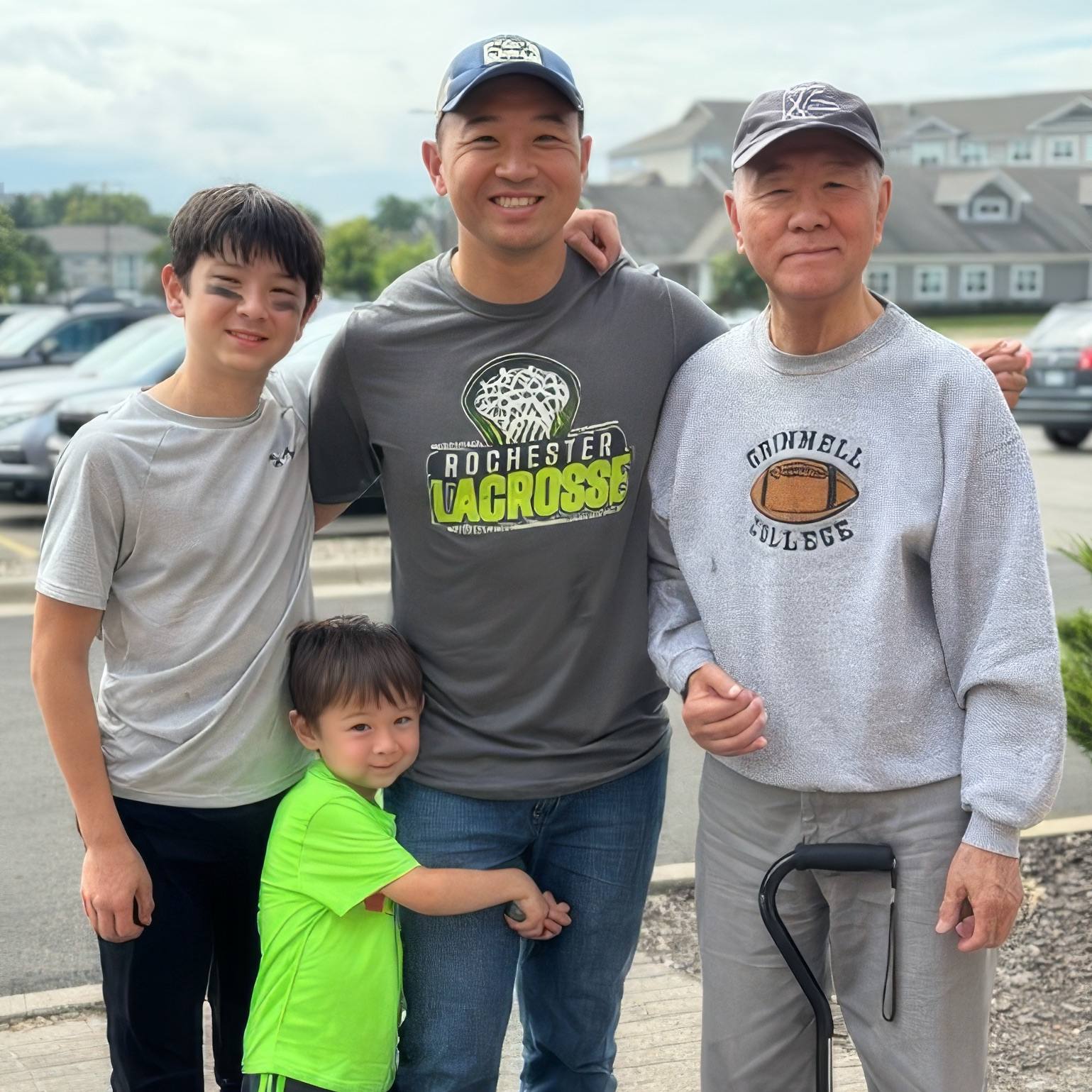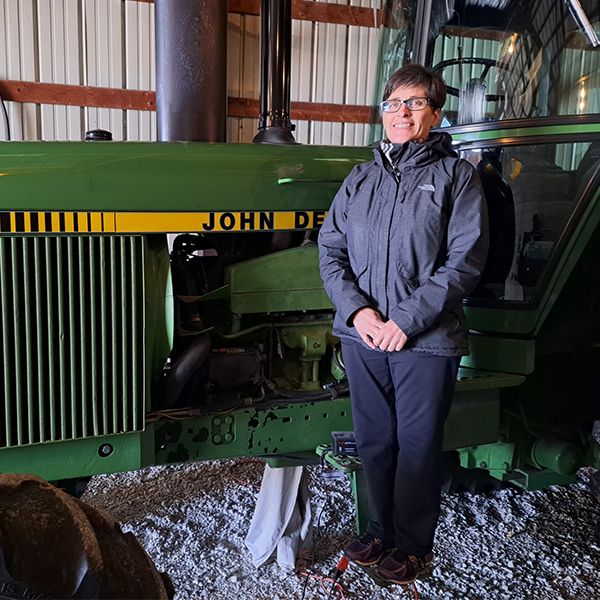
The Reibels have relied on Mayo Clinic for their care for 25 years. That experience has inspired them to donate to Mayo Clinic's Center for Regenerative Medicine.
Even in retirement, Dr. and Mrs. Reibel — or Jay and Barbara as their friends at Mayo Clinic have come to know them — are always on the go. They travel the world and have been actively engaged in a host of civic and community organizations.
But chronic pain in both knees threatened Jay's ability to continue his active lifestyle. Over time, it became almost debilitating. He had trouble climbing stairs or even sitting for long periods. He couldn't make it through an opera — a favorite activity — without rubbing his knees in pain. It was a constant distraction and presented a serious challenge.
Doctors in New York City, close to the Reibels' home in Greenwich, Connecticut, were unable to find an answer or relieve the pain. Jay knew he needed to go to Mayo Clinic.
Transformative relief
The Reibels have a 25-year patient history with Mayo Clinic that began with Robert Frye, M.D., a Mayo Clinic cardiologist who led what was then the Division of Cardiovascular Diseases from 1974 to 1984, as well as the Department of Medicine from 1987 to 1999. Their Mayo experiences have been overwhelmingly positive — so much so that they eagerly anticipate their appointments even in challenging circumstances.
"We love Mayo Clinic because from the very beginning of our experience, it's been so welcoming," Barbara says. "We actually look forward to our visits. People usually don't look forward to going to hospitals or clinics."
Jay had heard about regenerative medicine techniques, including the use of a patient's own stem cells, to restore knee function and alleviate pain. Shane Shapiro, M.D., medical director of the Regenerative Medicine Therapeutics Suites at Mayo Clinic in Florida, was the first researcher in the emerging field to lead a study on the safety and efficacy of the technique. Jay inquired about the procedure and was referred for treatment.
"We love Mayo Clinic because from the very beginning of our experience, it's been so welcoming."
Barbara Reibel
The results were almost beyond Jay's belief. "It was — and I don't misuse the word or use it hyperbolically — transformative," Jay says. "Within a week, I had significant pain relief. And it continues now."
The effect of the procedure was immediately apparent to Jay's family and close friends. "It would be really difficult watching him while he was in pain," Jay's daughter, Kate, says. "Now he's able to do the things he loves to do again."
A unique perspective
As a result of their numerous outstanding interactions with Mayo, the couple decided to express their gratitude by becoming benefactors. Supporting Mayo Clinic's Center for Regenerative Medicine seemed like a natural fit. Before the Reibels committed to their philanthropic gift, however, they wanted to learn more.
Jay has a unique perspective based on his personal experience in medicine and business. Trained as a psychiatrist, Jay, early in his medical career, held several prominent positions on national and medical governing and advisory bodies, including the board of directors of Blue Cross-Blue Shield of Greater New York, the New York County Medical Society, and the American Psychiatric Association, as well as a presidential appointment to the advisory body for Medicare and Medicaid. Jay has applied his talent and experience to establish a system of high-quality private psychiatric hospitals. He also founded a publicly traded company that was the first managed care organization. His company grew to serve millions of people across the country.
Barbara also brought her unique perspective to studying the opportunity. During her career, she worked as a public health adviser for the former Department of Health, Education, and Welfare.
"The focus on getting the discoveries from the laboratory to application to the patient is wonderful. I'm an example of that."
Jay Reibel, M.D.
At Jay's request, the Reibels spent two days at Mayo Clinic in Florida studying the Center for Regenerative Medicine from a clinical, organizational and business standpoint. They met with the clinic's leaders, including Gianrico Farrugia, M.D., Mayo Clinic's president and CEO — who was CEO of Mayo Clinic in Florida at the time — and Andre Terzic, M.D., Ph.D., the Michael S. and Mary Sue Shannon Family Director for the Center for Regenerative Medicine.
The Reibels spent time with researchers, visited laboratories and learned about the science behind new and emerging techniques that harness the body's natural ability to heal. It was an introduction to what Mayo Clinic calls translational medicine — developments in the laboratory that are quickly translated to patient care improvements.
Something magical
"We were beyond impressed," Jay says. "The research that we saw being done was explained to us in a clear manner that we could understand. The teams of researchers with whom we met all evidenced their commitment to the ethos of Mayo Clinic and its profound commitment to excellence."
Perhaps most important of all, the Reibels saw the immense impact regenerative medicine will have in the future, spanning medical specialties to improve the lives of patients, as well as reducing the economic burden that many patients and society as a whole faces today.

"I appreciate the importance of what is happening in regenerative medicine, not only to the lives of people, but to the cost savings to the economy of the country," Jay says. "The focus on getting the discoveries from the laboratory to application to the patient is wonderful. I'm an example of that."
Through their experience becoming Mayo Clinic benefactors, the Reibels have forged new friendships with leaders and researchers they have met. "We value the personal relationships that we've developed," Jay says. "They're stimulating, meaningful and very enjoyable."
These relationships add a unique dimension to the Reibels' experiences at Mayo Clinic, and they reflect Mayo's commitment to values such as integrity, compassion and healing. It is apparent in every interaction, and it is what sets Mayo Clinic apart.
"There's something magical about Mayo Clinic," Barbara says. "It's the staff, whether it be the top physicians, the nurses and physical therapists, or the clerks at the desk. Everyone we've encountered in all of our experiences has been so sweet and lovely and helpful. We can't tell people enough how different Mayo Clinic is from any other medical institution with which we are familiar."
Note: A version of this story previously was published in Mayo Clinic Magazine.
HELPFUL LINKS
- Read more about regenerative medicine.
- Check out Mayo Clinic's Center for Regenerative Medicine.
- Learn about giving to Mayo Clinic.
- Explore Mayo Clinic.
- Request an appointment.
Related Articles







